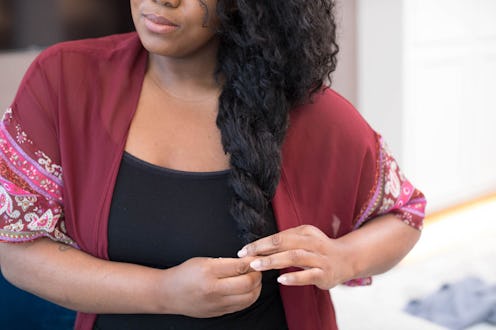Life
A New Study Found A Link Between Uterine Fibroids & A Kind Of Hair Loss

Uterine fibroids — small, usually benign, uterine tumors that can cause heavy periods — disproportionately affect Black women, but the reason why is still unclear. A new study has found a potential link between uterine fibroids and a kind of hair loss in Black women. The hair loss in particular is called central centrifugal cicatricial alopecia (CCCA), and it's a type of permanent hair loss that, like fibroids, affects Black women at higher rates than any other group.
The Johns Hopkins study, which was published in the December 27 issue of JAMA Dermatology, analyzed the medical records of hundreds of thousands of Black women and found that nearly 14 percent of Black women with CCCA also had a history of uterine fibroids. Those without CCCA only had fibroids 3.3 percent of the time.
Ginette A. Okoye, M.D. of Johns Hopkins and Yemisi Dina of Meharry Medical College analyzed patient data from 2013 to 2017. Of the 486,000 adult women whose data was reviewed, researchers found 16,212 cases of fibroids. Of the total population, 447 of the women studied had CCCA, and out of all the women with CCCA, 62 had uterine fibroids, according to the press release. This ratio shows that women with CCCA are five times more likely to have fibroids than women without the hair loss condition when age, race, and sex are controlled.
The National Institutes of Health (NIH) estimates that as high as 17 percent of Black women have CCCA. Dr. Yolanda Lenzy explained potential reasons why Black women are more likely to be diagnosed with CCCA to BlackDoctor.org. “We’re still researching the exact cause, but we think it’s multifactorial: one being genetics. We do know that people of African descent are more prone to scarring conditions like keloids and CCCA is a scarring type of alopecia so it may be a genetic predisposition in a lot of people.” Uterine fibroids can also cause scarring on the uterus from extra layers of tissue, like CCCA and other conditions that, as Dr. Lenzy noted, Black people are more prone to having.
While the study does present a correlation between CCCA and uterine fibroids, that does not mean one condition causes the other. Crystal Aguh, M.D., assistant professor of dermatology at the Johns Hopkins University School of Medicine, said, “the cause of the link between the two conditions remains unclear” in a press release.
Although this study doesn’t prove causation, the correlation is strong enough that Dr. Aguh does recommend physicians make sure their patients now their risks and begin screening women with CCCA for uterine fibroids, especially if they are already experiencing the symptoms, which include heavy menstrual bleeding, pain while having sex, and frequent urination. Dr. Aguh also recommends getting screened for other conditions related to excess scar tissue.
The study did not analyze health outcomes for white women, but as noted in a press release, 70 percent of white women will develop fibroids by age 50, compared to between 80 and 90 percent of Black women. While uterine fibroids can cause health complications, over 99 percent of them are benign (non-cancerous).
If you are experiencing unexplained pelvic or lower back pain or pressure, or a change in your period, you should definitely talk to your doctor if you might have fibroids. Your doctor will be able to use an x-ray, ultrasound, or hysteroscopy to tell whether you have fibroids or not. And if you already know you have CCCA, it won’t hurt to ask your doctor to screen you for uterine fibroids. Getting screened early can help you avoid more serious medical complications; knowing how your body is functioning is key to remaining healthy.